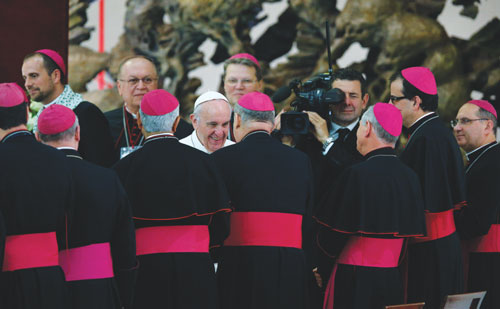
VATICAN CITY – It was a rocky road and sometimes it seemed as if they would get stuck. But at the end of the three-week family synod in Rome, the world’s Catholic bishops managed to produce a consensus document that struck a fresh pastoral tone.
The final report, which has not yet been translated into English, examines a huge range of painful and complex issues relating to families, calling for the Church to be attentive to the ways in which people “live and suffer as result of their condition.”
After an early struggle in the synod in which a vigorous minority sought to make the assembly about teaching and doctrine, the pastoral focus prevailed. It took for granted existing Church teachings but looked for concrete ways of putting into practice God’s mercy.
“The Church starts from the concrete realities of today’s families, all in need of mercy, starting with those who suffer most,” the final report said, likening the Church to “a lighthouse or a torch carried in the midst of the crowd to bring light to all those who have lost their way or who find themselves in the midst of a storm.”
After surveying the challenges to marriage and family in the first part, and reviewing the Church’s teaching and insights in the second, the final part turned to concrete actions the Church can now take.
A major theme is the need to bolster preparation and support for married couples, improving pre-marriage catechesis and building in teaching on marriage and family into the education of the young. Marriage courses should be “geared to the vocational discernment both as an individual and as a couple,” and young couples in the early years of marriage should be better integrated into parish groups to overcome the isolation that often follows the wedding, the final report says, adding that creating “meaningful bonds” is key to overcoming the pressures on young marriages.
The final part of the document spells out ways of walking with people in a huge variety of what the report calls “complex situations”: cohabitation, civil marriage, mixed and interreligious marriages, abandoned spouses, single parents, as well as the divorced.
Sometimes cohabitation and civil marriage are chosen not because the couple is rejecting sacramental marriage, but rather for reasons of culture, finances or circumstance, the report says, urging the Church to see these as potential stepping stones to sacramental marriage.
A particularly urgent need is for “a dedicated ministry to all those whose marital relationship is broken,” says the report, noting that relationship breakdown can become an opportunity for “reflection, conversion, and entrusting to God.” When couples experience problems in their marriage, they should be able to count on the help and support of the Church: with help and encouragement most marital crises can be overcome.
The most controversial paragraphs – one of which attained the required two-thirds majority by just one vote – make a call for divorced and remarried Catholics to be integrated into Church life, noting that “the logic of integration is the key to their pastoral accompaniment.” The report then sets out an “internal forum” process, under the guidance of a priest, to enable “the formation of a correct judgment on what obstacles exist to a fuller participation in the life of the Church and on the steps that can encourage that participation and make it grow.”
Although the report does not mention what that participation could involve, and makes no specific reference to the sacraments, the wording is sufficiently ambiguous to allow those favoring an opening in this area to say it remains on the table, while those opposed can claim that the document in effect reasserts existing practice.
Cardinal Walter Kasper, the German theologian who has led to the call for an opening, said afterwards that “the door has been opened to the possibility of the divorced and remarried being granted Communion,” but that the question had not been resolved.
But Cardinal George Pell, the Vatican’s Australian finance chief who emerged at the synod as leader of the opposition to the proposal, said the absence of any reference to Communion was “fundamental” and that any suggestion of a change to existing practice was “misguided.”
In the end, the only person who can resolve the ambiguity is Pope Francis, who is likely to issue a post-synodal apostolic exhortation (possibly under the title of “The Joy of the Family”) in the first half of 2016.
